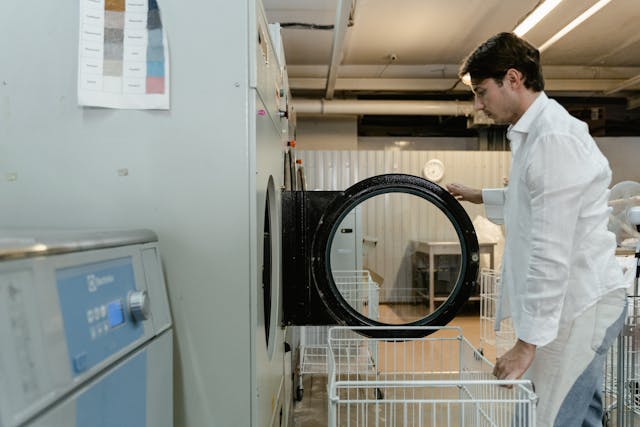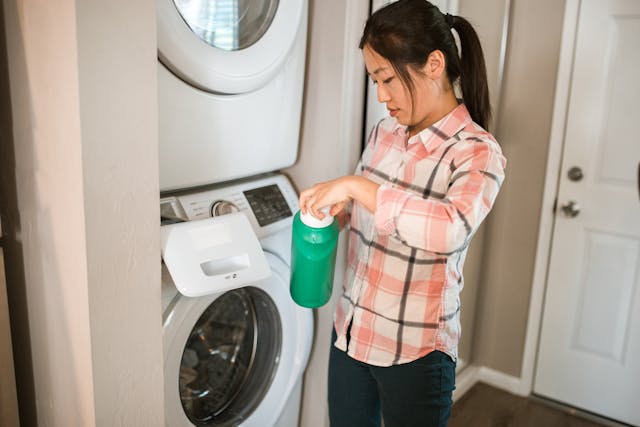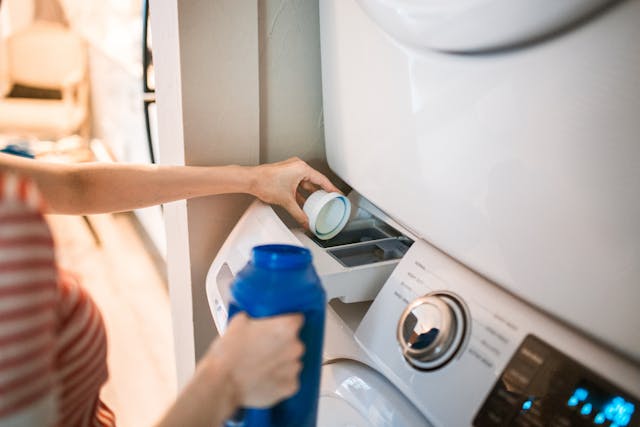Laundry detergent is a household essential that is used to clean clothes and linens. However, choosing the right detergent can be challenging, especially for those who are concerned about the safety of their families and the environment. With so many options available on the market, it can be difficult to determine which laundry detergent is the safest and most effective.
Understanding the ingredients in laundry detergents is essential when choosing a safe product. Many conventional laundry detergents contain harmful chemicals such as phosphates, surfactants, and fragrances that can be harmful to human health and the environment. Fortunately, there are many safe and eco-friendly laundry detergents available that are free from these harmful chemicals.
When choosing a laundry detergent, it is important to consider health and safety, environmental impact, performance and effectiveness, and cost and value considerations. By taking these factors into account, consumers can make an informed decision and choose a laundry detergent that is safe, effective, and affordable.
Key Takeaways
- Understanding the ingredients in laundry detergents is essential when choosing a safe product.
- Consumers should consider health and safety, environmental impact, performance and effectiveness, and cost and value considerations when choosing a laundry detergent.
- Safe and eco-friendly laundry detergents are available that are free from harmful chemicals.
Understanding Laundry Detergents
Laundry detergents are cleaning agents used to remove dirt and stains from clothes. They are available in different forms, including liquid, powder, and pods. In this section, we’ll explore the types of laundry detergents, key ingredients in detergents, and how detergents work.
Types of Laundry Detergents
There are several types of laundry detergents available in the market, including:
- Liquid Detergent: Liquid detergents are the most popular type of laundry detergent. They are easy to use and are effective in removing stains and dirt. They are also available in different fragrances.
- Powder Detergent: Powder detergents are effective in removing stains and dirt but can be messy to use. They are also available in different fragrances.
- Detergent Pods: Detergent pods are a convenient and easy-to-use alternative to liquid and powder detergents. They are pre-measured and dissolve quickly in water, leaving no residue behind.
Key Ingredients in Detergents
Laundry detergents contain several key ingredients that help in cleaning clothes. These ingredients include:
- Surfactants: Surfactants are the primary cleaning agents in laundry detergents. They help in removing dirt and stains by breaking them down into smaller particles.
- Enzymes: Enzymes are biological molecules that help in breaking down protein-based stains like blood and grass.
- Builders: Builders are ingredients that help in softening hard water and enhancing the cleaning power of detergents.
- Fragrances: Fragrances are added to detergents to give them a pleasant smell.
How Detergents Work
Detergents work by creating suds that lift dirt and stains from clothes. When detergent is added to water, the surfactants in it reduce the surface tension of water, allowing it to penetrate the fabric and loosen dirt and stains. The dirt and stains are then suspended in the water and washed away when the clothes are rinsed.
In conclusion, understanding the types of laundry detergents, key ingredients in detergents, and how detergents work can help you choose the best detergent for your laundry needs.
Health and Safety Considerations
When it comes to choosing a laundry detergent, health and safety should be a top priority. Here are some important considerations to keep in mind:
Detergents and Sensitive Skin
For those with sensitive skin, it’s important to choose a laundry detergent that is gentle and fragrance-free. Look for detergents that are labeled as “hypoallergenic” or “fragrance-free,” and avoid those that contain dyes, bleach, or brighteners, as these can all cause skin irritation.
Allergies and Irritants
If you have allergies or eczema, it’s important to choose a laundry detergent that is free from harmful ingredients that can trigger an allergic reaction. Avoid detergents that contain phthalates, petroleum, or parabens, as these can all be harmful to your health.
Toxic Ingredients to Avoid
When choosing a laundry detergent, it’s important to avoid toxic ingredients that can harm both your health and the environment. Look for detergents that are free from harsh chemicals, and avoid those that contain fragrances or essential oils, as these can contain harmful chemicals that can cause skin irritation and other health problems.
By keeping these health and safety considerations in mind, you can choose a laundry detergent that is safe and effective for both you and the environment.
Environmental Impact
When it comes to choosing a laundry detergent, it’s important to consider the environmental impact of the product. Here are some key factors to keep in mind:
Eco-Friendly Detergent Options
Many laundry detergents on the market today are marketed as “eco-friendly” or “green.” These products often contain plant-based ingredients and are free from phosphates, which can be harmful to the environment. It’s important to note, however, that not all “eco-friendly” detergents are created equal. Some may still contain ingredients that are harmful to the environment, so it’s important to do your research and choose a product that is truly environmentally friendly.
Biodegradability and Sustainability
Another important factor to consider is the biodegradability of the detergent. This refers to how easily the product breaks down in the environment. Ideally, you want a detergent that is highly biodegradable, as this means it will not leave harmful chemicals behind in the water supply. Additionally, it’s important to consider the sustainability of the product. This includes factors like the sourcing of ingredients and the manufacturing process.
Packaging and Plastic Use
Finally, it’s important to consider the packaging and plastic use of the detergent. Many laundry detergents come in plastic bottles, which can be harmful to the environment. Look for products that come in plastic-free packaging, such as cardboard boxes or paper bags. Additionally, some companies offer laundry detergent sheets, which are a more environmentally friendly alternative to traditional liquid detergents.
Overall, when choosing a laundry detergent, it’s important to consider the environmental impact of the product. Look for products that are truly eco-friendly, highly biodegradable, and packaged in a sustainable way. By making an informed choice, you can help to reduce your impact on the environment and protect our planet for future generations.
Performance and Effectiveness
When it comes to laundry detergent, performance and effectiveness are two key factors that consumers consider. In this section, we will discuss the stain removal capabilities, detergents for different water types, and effectiveness in various washing machines.
Stain Removal Capabilities
One of the most important factors in choosing a laundry detergent is its ability to remove stains. Different detergents have varying levels of effectiveness when it comes to removing tough stains like dirt, grass, and food. Some popular brands like Tide, Gain, and Xtra claim to have powerful stain-fighting capabilities, but it’s important to note that not all stains are created equal.
Enzymes are often added to laundry detergents to help break down tough stains. However, not all detergents contain the same types or levels of enzymes. It’s important to choose a detergent that is effective for the specific types of stains you are dealing with.
Detergents for Different Water Types
Hard water can make it difficult for laundry detergent to work effectively. If you have hard water, it’s important to choose a detergent that is specifically designed for that type of water. These detergents contain ingredients that can help soften the water and improve the cleaning power of the detergent.
On the other hand, if you have soft water, you may not need a detergent that is specifically designed for that type of water. In fact, using a detergent that is too strong for your water type can actually damage your clothes.
Effectiveness in Various Washing Machines
Laundry detergents can also vary in their effectiveness depending on the type of washing machine you have. High-efficiency (HE) laundry detergent is specifically designed for use in HE washers, which use less water and energy than traditional top-loading washers. Using a regular detergent in an HE washer can result in too many suds, which can damage the machine and reduce its effectiveness.
It’s also important to consider the water temperature and wash cycle when choosing a laundry detergent. Some detergents work better in cold water, while others require hot water to activate their cleaning power. Additionally, some detergents are designed for use in short wash cycles, while others work best in longer cycles.
In conclusion, when choosing a laundry detergent, it’s important to consider its performance and effectiveness. Look for a detergent that is effective at removing the specific stains you are dealing with, is designed for your water type and washing machine, and works well in the water temperature and wash cycle you typically use.
Cost and Value Considerations
When it comes to choosing the safest laundry detergent, cost and value are important factors to consider. Here are some things to keep in mind:
Comparing Detergent Prices
The price of laundry detergent can vary greatly depending on the brand, size, and type of detergent. It’s important to compare prices to ensure you’re getting the best deal. Some brands, like Molly’s Suds and Biokleen, may be more expensive than traditional detergents, but they often come in larger sizes or concentrate formulas, which can make them more cost-effective in the long run.
Determining the Best Value
When comparing prices, it’s important to consider not just the cost of the detergent, but also its effectiveness and the number of loads it can clean. A cheaper detergent may seem like a good deal, but if it requires more product per load or doesn’t clean as effectively, it may end up costing more in the long run. Look for detergents that are specifically designed to meet your laundry needs, whether that’s for sensitive skin, tough stains, or brightening whites.
Bulk Buying and Sales
Buying laundry detergent in bulk or taking advantage of sales can also help save money. Some stores offer discounts when you buy multiple bottles of detergent at once, or may have sales on specific brands or types of detergent. Additionally, some detergents may come with fabric softener included, which can save you money on buying separate fabric softener.
Overall, when considering the cost and value of laundry detergent, it’s important to weigh the benefits of safer, more eco-friendly options against the cost of traditional detergents. By doing a bit of research and comparing prices, you can find a detergent that meets your laundry needs and fits your budget.
Specialized Laundry Detergents
When it comes to laundry detergents, there are several specialized options available in the market. These options cater to specific needs such as babies and children, fragrance-free and natural options, and high-efficiency (HE) detergents.
Detergents for Babies and Children
Babies and children have delicate skin that requires gentle care. Using regular laundry detergents can cause skin irritation and rashes. Therefore, it is essential to use laundry detergents that are specially formulated for babies and children. These detergents are usually fragrance-free, hypoallergenic, and free from harsh chemicals.
Some popular baby laundry detergents include Dreft, Babyganics, and Seventh Generation. These detergents are available in liquid, powder, and pod forms.
Fragrance-Free and Natural Options
Fragrances added to laundry detergents can cause allergies and skin irritation. Therefore, some people prefer using fragrance-free and natural laundry detergents. These detergents are free from synthetic fragrances, dyes, and other harsh chemicals.
Some popular fragrance-free and natural laundry detergents include Tide Free & Gentle, Seventh Generation Free & Clear, and Method Laundry Detergent. These detergents are available in liquid, powder, and pod forms.
High-Efficiency (HE) Detergents
High-efficiency (HE) washing machines require special laundry detergents that are low-sudsing and quick-dissolving. Using regular laundry detergents in HE washers can cause damage to the machine and affect its performance.
HE detergents are available in liquid, powder, and pod forms. Some popular HE detergents include Tide HE, Gain HE, and Arm & Hammer Clean Burst.
In conclusion, specialized laundry detergents cater to specific needs and preferences. By choosing the right laundry detergent, one can ensure clean and fresh clothes without compromising on skin health or machine performance.
Frequently Asked Questions
What ingredients should I avoid in laundry detergents for sensitive skin?
People with sensitive skin should avoid laundry detergents that contain fragrances, dyes, and preservatives such as methylisothiazolinone and formaldehyde. These ingredients can irritate the skin and cause allergic reactions. It is best to choose a laundry detergent that is free of these ingredients and labeled as hypoallergenic or for sensitive skin.
How do I choose a natural laundry detergent that is effective yet gentle?
When choosing a natural laundry detergent, look for products that are plant-based and free of harsh chemicals such as phosphates, chlorine, and artificial fragrances. It is also important to choose a detergent that is effective in removing stains and odors. Look for products that are labeled as eco-friendly or biodegradable.
What are the best laundry detergents recommended by dermatologists?
Dermatologists recommend laundry detergents that are free of fragrances, dyes, and preservatives. Some of the best laundry detergents for sensitive skin include Seventh Generation Free and Clear, All Free Clear, and Tide Free and Gentle.
Are there any safe and non-toxic laundry detergents suitable for babies?
Yes, there are many safe and non-toxic laundry detergents that are suitable for babies. Look for products that are labeled as baby-safe or hypoallergenic. Some of the best options include Dreft Stage 1: Newborn Liquid Detergent, Babyganics 3X Baby Laundry Detergent, and Puracy Natural Liquid Laundry Detergent.
What do the Environmental Working Group (EWG) ratings indicate about laundry detergent safety?
The Environmental Working Group (EWG) rates laundry detergents based on their safety and environmental impact. Products with high ratings are considered to be safer and more environmentally friendly than those with low ratings. Consumers can use these ratings to make informed decisions about which laundry detergents to purchase.
How can I identify endocrine disruptors in laundry detergent ingredients?
Endocrine disruptors are chemicals that can interfere with the body’s hormonal system. To identify endocrine disruptors in laundry detergent ingredients, look for ingredients such as phthalates, parabens, and triclosan. These ingredients have been linked to endocrine disruption and should be avoided in laundry detergents.















Comments are closed.